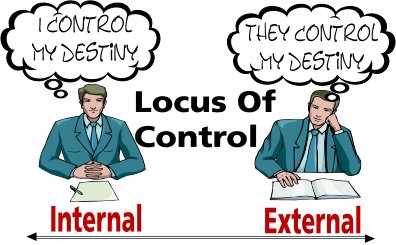Who holds the keys to your success?
Have you ever stopped to think about when something goes wrong for someone, they respond to the situation in one of two distinctively different ways? There are people who find fault in their environment for the reasons for outcomes, and people who look within to find the reasons.
“Locus of Control” What does this even mean?
Locus is a Latin word meaning a particular location, point, or place.
Control is the where the power is given for a particular set of events.
Locus of Control effectively means where a person places the “point of control”, be that on their own shoulders, or that of something or someone else in their environment, whether it be a good outcome or a bad one.
Internal vs. External
When we discuss the locus of control in psychological terms, we are typically referring to whether an individual tends to place the “blame” or “credit” for the things that happen to them outside of their control, or within it. In the 10+ years of life skills counseling and psychiatric care that I have been exposed to (and law enforcement) I have come to notice that there are two distinctly different ways people process the outcomes in their life. They either take ownership of a decision they made, a level of effort, or their quality of work as the main reason for an outcome, or they feel as though the primary factors associated with the outcome exist outside of their own control. The interesting thing about learning about, and discussing locus of control, is that you begin to see this in all aspects of your life.
Internal Locus of Control
When a person has a locus of control heavily weighted to the “internal” side they tend to take personal responsibility for the outcomes in their life. They make statements like “I really should have spent more time on that study sheet” or “I’ll do better next time”. They make it clear THEY are responsible for the outcome and often intend to do better in that area after they identify what THEY did wrong or could have done differently. What’s wrong with that, right? It sounds like they’re an outstanding member of society and probably constantly improve all aspects of their life, right? Well, the answer isn’t so easy. Just like most things in Psychology, there is a fine line between healthy and unhealthy, and if you find yourself overly Internal in your locus of control, you will soon feel the weight of the world on your shoulders. “I’m so stupid, I can’t believe I would let that happen” and “I never get anything right” are statements that they are known to make when their perception becomes skewed towards an internal locus of control regardless of the circumstance. The fact is there ARE situations that are outside of our control and it is possible a person can become so invested in the concept that they control every situation that they begin to beat themselves up over things they truly have no control over, anxiety and depression then seep into their daily existence.
External Locus of Control
When a person has an “External” locus of control, they tend to place the responsibility of outcomes outside of themselves. They often will name an individual, circumstance, or environmental factor responsible for the outcome instead of themselves. You can see where this is going for unhealthy thought processes in both directions. “That school is stupid… The only reason I failed my classes is because the parking there is terrible, which led to me being late for school every day, which led to my professors not understanding my situation and them not passing me” (a statement I’ve heard before) or “The team did really good, but it really had nothing to do with me, I’m the weakest link and they all just carry my weight”. The problem with a heavily weighted external locus of control, is that the individual rarely takes responsibility for anything (good or bad) therefore don’t have the motivation to change anything they are doing. If you think about it, what is the point of changing YOUR behavior/actions when EVERYONE else, or EVERYTHING else is the REAL reason for the problem to begin with… That’s just plain stupid! Of course, most of the time EVERYONE around them completely disagrees with where the point of control actually lies.
So how does all this translate into the formation of healthy behavior and thought? It’s simple. Knowledge is power. I like that saying. I would put a twist on it though. Knowledge is great, but if you imagine that knowledge is all locked up in the pages of a book, and you can’t read the book because your vision is blurry, then what good is it? The problem with locus of control is that we have extreme difficulty objectively viewing our own lives and our approach to it. We must change the lenses through which we view life in order to see it more clearly, and to do so we must often lean heavily on the input of others. My advice is to take a step back, and listen to your environment and those around you. If you tune in, the environment and people in it are more than happy to reveal to you how off base your own thoughts are on the topic of internal and external locus of control. When people make statements like “You beat yourself up too much, that’s not your fault” or “This seems to be completely your fault, why don’t you change what you’re doing” you should probably listen… They’re probably more right than you know!
